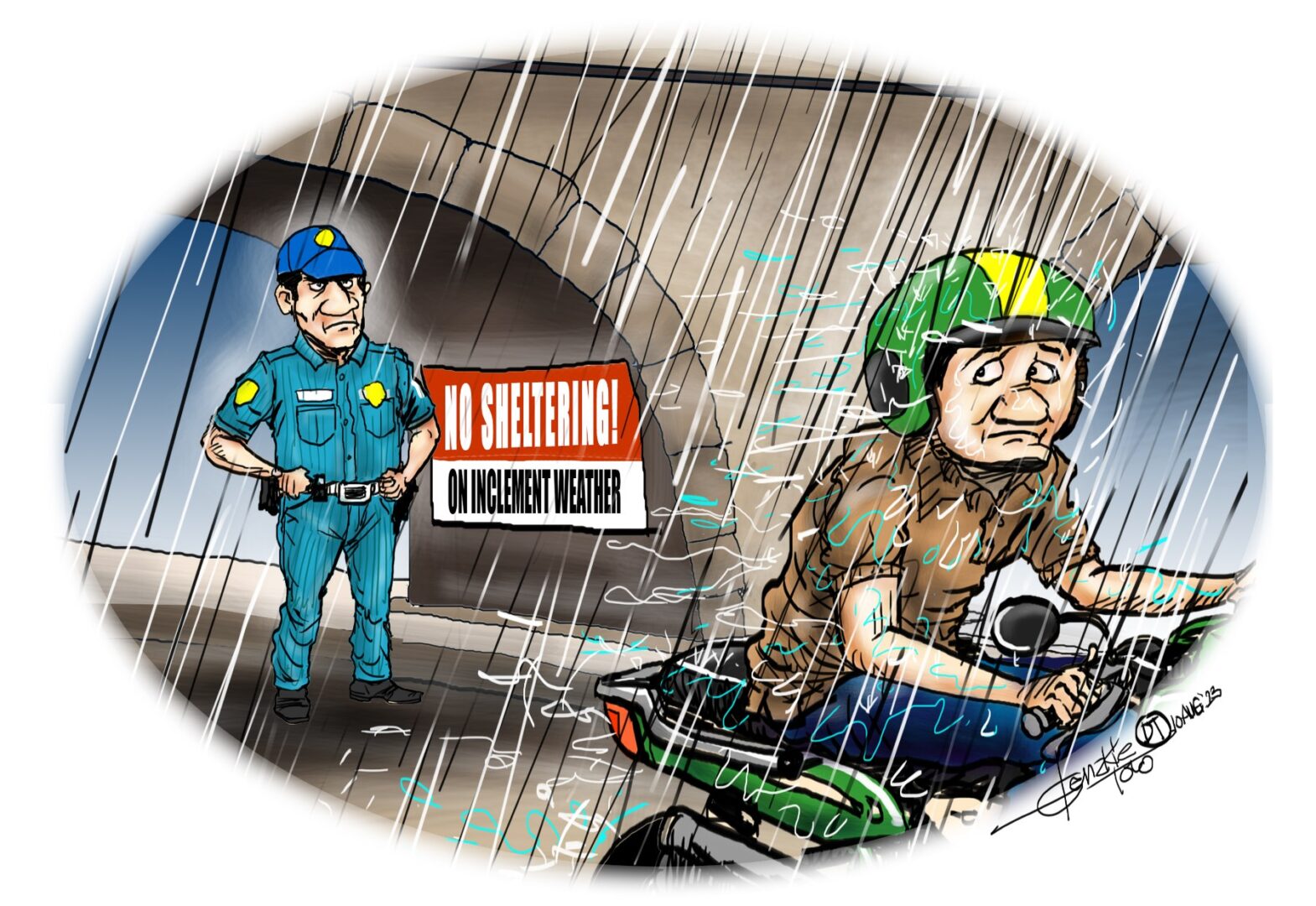Is it fair to fine riders seeking shelter under overpasses, flyovers, and other public infrastructure during inclement weather? Is it humane? These and other questions are being asked in light of the controversy generated by the Metropolitan Manila Development Authority order which does not sit well, particularly with delivery riders who are bound to be the most affected by the fines.
As road users ourselves, we can understand the MMDA’s rationale behind this controversial decision. It merely wants to deter individuals from using these spaces for shelter, as it leads to congestion and potential safety hazards. However, the measure has sparked debates on its humaneness and fairness.
Firstly, these infrastructures were designed to cater to pedestrian and vehicular traffic, and using them as makeshift shelters may lead to congestion and hamper traffic flow. Secondly, it poses safety risks, as accidents or collisions could occur when riders congregate under these structures, especially during heavy rainfall. Lastly, the MMDA aims to encourage the responsible use of public spaces and promote alternative, safer options for seeking shelter during adverse weather conditions.
The question of the fine’s humaneness revolves around the impact it has on the vulnerable population and whether it addresses the root cause of the problem. It is essential to consider that many motorcycle riders in Metro Manila come from low-income backgrounds and use their motorcycles as their primary mode of transportation due to their affordability.
These riders often have limited options during inclement weather, making them susceptible to harsh elements without a place to seek shelter.
Applying fines to such individuals may exacerbate the financial burden on them, pushing them further into poverty and compromising their access to essential resources. No less than Senator JV Ejercito, a motorcycle enthusiast himself, has called on the MMDA to consider the socio-economic context when implementing policies to ensure that they do not disproportionately affect the most vulnerable members of society.
A more humane approach, we believe, should involve providing alternative shelters or designated areas for motorcycle riders during adverse weather conditions, rather than resorting to punitive measures.
The fairness of the fine is likewise a contentious issue, as it raises questions about equal treatment under the law. While the MMDA seeks to regulate the use of public spaces to maintain order and safety, critics argue that this approach unfairly targets motorcycle riders while neglecting other forms of public congestion caused by various factors.
This selective enforcement may lead to perceptions of bias or discrimination against motorcycle riders, especially if the other causes of congestion are not equally addressed.
Moreover, the effectiveness of the fine in achieving its intended purpose must also be considered. If the primary goal is to ease congestion and promote road safety, a more comprehensive approach involving education, awareness campaigns, and improved infrastructure may yield better results.
Focusing solely on punitive measures without addressing the underlying issues would be an ineffective way to achieve the desired outcome.
To strike a balance between regulation and compassion, the MMDA should consider several alternative solutions. Firstly, it could collaborate with local communities and organizations to set up designated areas where motorcycle riders could shelter during adverse weather conditions. These areas should be well-maintained and designed to prevent congestion and ensure the safety of the riders.
Secondly, the MMDA could implement education and awareness programs to inform motorcycle riders about the importance of the responsible use of public spaces and the potential hazards of seeking shelter under overpasses and flyovers. Empowering individuals with knowledge can lead to better compliance and safer behaviors.
While the MMDA’s intention to ensure order and safety on public roads is commendable, the fine’s humaneness and fairness are questionable. To be truly humane and fair, alternative solutions should be explored, considering the circumstances of vulnerable motorcycle riders and addressing the root causes of the problem.
By combining regulation with compassion and understanding, the MMDA can strive for a more inclusive and effective approach to tackling the challenges posed by adverse weather conditions on the roads of Metro Manila.
